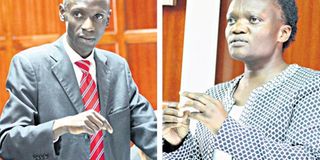Police blamed for post-poll chaos

State Counsel Emmanuel Bitta cross examines national human rights commission boss Patricia Nyaundi on July 9, 2014. PHOTOS | PAUL WAWERU
What you need to know:
- A number of agencies and eight survivors of sexual violence have sued the state.
- Patricia Nyaundi was with the women lawyers’ lobby, Fida, during the post-poll violence. She later worked with the Truth, Justice and Reconciliation Commission.
A rights watchdog boss has accused police of failing to take action against perpetrators of sexual violence during the 2007/2008 post-election mayhem.
Ms Patricia Nyaundi, the chief executive officer of the Kenya National Commission on Human Rights said police inaction gave the perpetrators the courage to practice impunity.
“For this, victims feared to report and still live in fear,” she said.
Ms Nyaundi was testifying on Wednesday in a case in which a number of agencies and eight survivors of sexual violence have sued the state.
They want the government compelled to compensate thousands of victims for their suffering at the hands of civilians and police.
She added that men who were sexually molested or forcibly circumcised did not want to raise the matter because security agents were passive and for fear of stigmatisation.
She said it was the duty of the police to ensure the rights of victims were protected.
“Men could not come forward for fear of being ostracised. Many still live in denial,” she said.
She supported the petition by the victims saying they had approached the court so that their rights could be respected and enforced.
“What we have seen is discrimination of those who went through the sexual violence ordeal. IDPs were given land or about Sh400,000 compensation. It is therefore discriminatory not to consider these victims for redress too,” she said.
WAKI REPORT 'SHOULD BE ADOPTED'
The victims also claim the government denied them emergency medical services.
Ms Nyaundi was with the women lawyers’ lobby, Fida, during the post-poll violence. She later worked with the Truth, Justice and Reconciliation Commission.
She defended the Waki Commission report on the violence saying it was a good reference point.
“The report should be adopted by the court. It contains testimonies, which can help determine compensation.”
She said she participated in preparing the Waki and Truth, Justice and Reconciliation Commission reports which detailed how police officers deployed in hotspots to protect vulnerable groups turned out to be perpetrators of sexual and gender-based violence.
The hearing continues.





